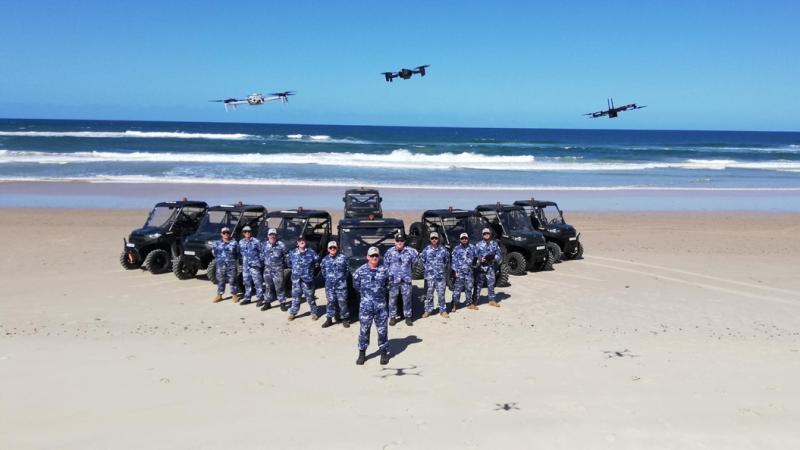27 August 2024
Fox Rowell’s husband used to finish each year feeling the pressures of military life and talking about discharging.
“He wanted to quit because the pressures of the military were getting too much. I’d feel like I was walking on eggshells,” she said.
But at the end of last year, something changed.
The only difference was that a MakerSpace opened at Holsworthy in April 2023.
“He stayed on an even keel when the year was over,” Mrs Rowell said.
“He’s been able to go into a MakerSpace, talk to a site supervisor, print something or work on a big project.”
Mrs Rowell started work as a site supervisor at the Holsworthy MakerSpace in February and noticed her husband wasn’t the only one benefiting from the chance to work on a project.
“I’ve had people come in who are not in the best frame of mind,” she said.
MakerSpace facilities provide soldiers of any rank and trade with supervised access to manufacturing technologies, foundational for developing ‘MakerSkills’, with the hands-on experience benefiting users.
“They’ll leave either with a smile on their face or they’ll be visibly more relaxed,” Mrs Rowell said.
The Holsworthy MakerSpace features tools such as 3D printers, vinyl cutter, soldering equipment, CNC [computer numerical control] machine and a laser engraver, so personnel can create solutions, solve problems and develop technical skills.
Site supervisors will teach anyone coming in how to design, develop and test a variety of objects, some having use in day-to-day applications that improve soldiers’ ability to perform on the job.
Examples include mine-markers and a scale model of a medium-girder bridge, but the skills learnt are often more important that what’s been produced.
With 3D printing, this means how to check a file is good to print, to slice it, what materials were needed and how long printing would take.
Mrs Rowell sees people shift from simple 3D printing into perfecting designs, such as reprinting car parts with materials to withstand higher temperatures – enhancing their problem-solving skills.
“They’ll leave either with a smile on their face or they’ll be visibly more relaxed."
“Then you’ll see them go into Fusion 360 and make their own part, which is a phenomenal skill to know,” she said.
“It’s great seeing them print off a handful of things; then they’ll want to make their own designs. They’re learning how to get from a design in their head to a physical object.”
Personnel are encouraged to create new designs. However, there are restrictions on making land material or anything that looks like a weapon.
“If someone thinks a bright-pink Barbie Glock would be great for training, they can’t come in and just make it. It’s illegal to have the file and print it,” Mrs Rowell said.
Any replica weapon or inert training aid that resembles a weapon needs commanding officer as well as Army Headquarters approval before it can be made.
But personnel have created plastic gauges to quickly assess the diameter explosive ordnance and fin set for an inert grenade to help students recognise an improvised explosive ordnance they may find.
Visitors to the MakerSpace vary from between 20-50 personnel a day, including a number of multimedia technician trainees encouraged to attend by their course manager, Warrant Officer Class Two (WO2) David Eason.
His students learn to create vector art on-course and can use the laser cutter to cut acrylic objects or print shirts.
He said the MakerSpace also helped his trainees hone their 3D design skills by printing objects.
“It’s great seeing them print off a handful of things; then they’ll want to make their own designs. They’re learning how to get from a design in their head to a physical object.”
“Since the facility’s been here, I’ve seen all my students come down and they print their own objects,” WO2 Eason said.
“I’ve heard that when they’ve been posted away, they’ve used other MakerSpace facilities to develop training products.”
WO2 Eason hoped it would also help students understand how to project manage an idea through design, testing and development.
“As much as people in Defence have great ideas, it’s not as simple as flicking a switch and changing it because it suits everyone,” he said.
Mrs Rowell tries not to have rank in the room when people work on their own projects, to ensure they have a break from the stressors of work.
She used to teach coding, electronics and 3D printing in schools but the MakerSpace also fits her other background as a psychotherapist.
“It appeals to the counselling side of me. For soldiers to come and do something and not be annoyed or bothered is fantastic,” she said.
“I’ve got the best job in the world, seeing people come in after stressful work but they’ll be excited because they have their next print to do.”


